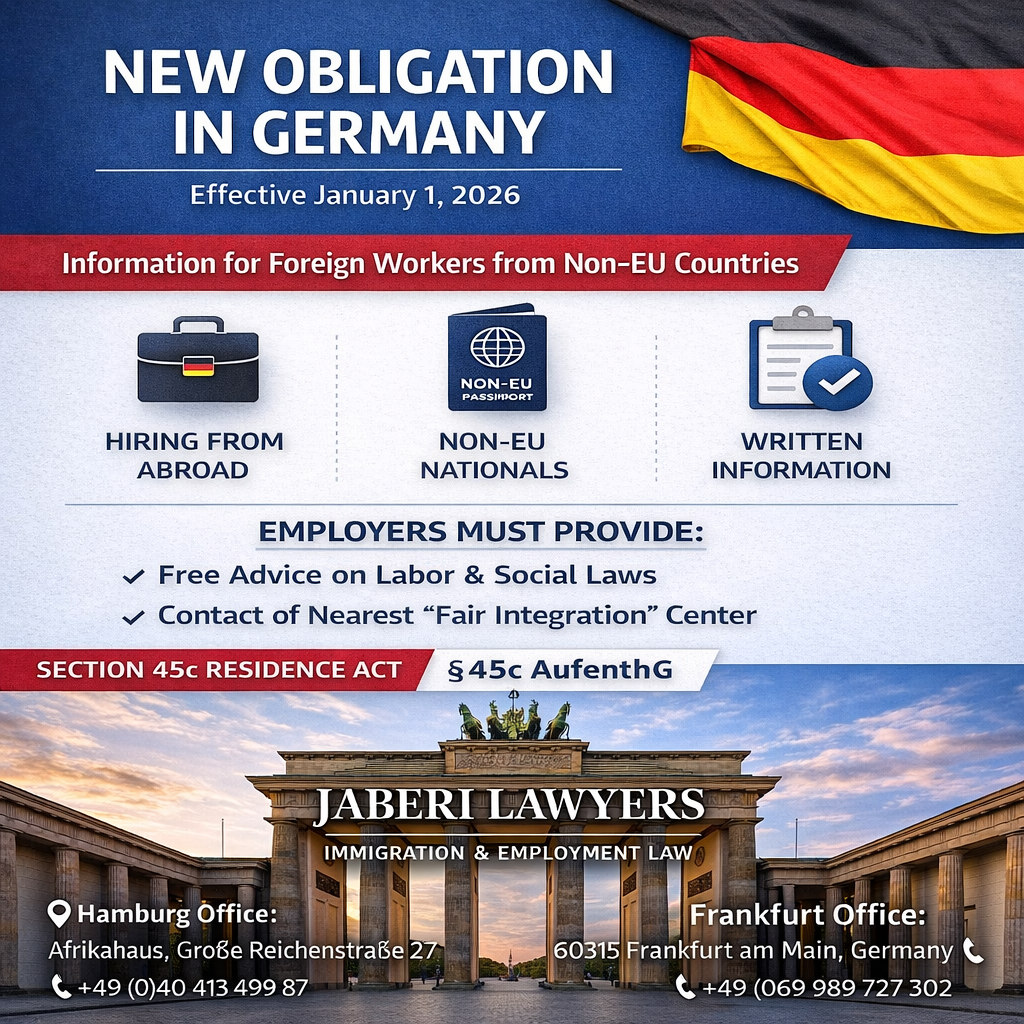Germany’s labour law, known as Arbeitsrecht, forms the foundation of one of the most balanced employment systems in the world. It ensures fair treatment, workplace security, and transparent employer-employee relations. Whether you are an international company hiring in Germany or an employee relocating here, understanding your rights and obligations under German labour law is essential.
At Jaberi Lawyers, we specialise not only in immigration and business law but also in labour and employment law — providing comprehensive support to both employers and employees in navigating Germany’s complex legal framework.
Understanding the Basics of German Labour Law
German labour law is a combination of statutory provisions, case law, and collective agreements that protect workers while allowing businesses to operate efficiently. Its key sources include:
Bürgerliches Gesetzbuch (BGB) – The German Civil Code regulating employment contracts, notice periods, and termination.
Kündigungsschutzgesetz (KSchG) – The Employment Protection Act safeguarding employees from unfair dismissal.
Arbeitszeitgesetz (Working Hours Act) – Regulates working hours, breaks, and rest periods.
Bundesurlaubsgesetz (Federal Vacation Act) – Governs employees’ entitlement to paid annual leave.
Tarifvertragsgesetz (Collective Agreements Act) – Outlines the rights and validity of collective agreements between employers and trade unions.
Together, these laws ensure that employees enjoy job security and proper working conditions, while employers maintain clarity and structure in managing their workforce.
Employment Contracts: Rights and Obligations
An employment relationship in Germany typically starts with a written employment contract (Arbeitsvertrag). It should clearly define:
- Job title and responsibilities
- Working hours and remuneration
- Holiday entitlement
- Probation period (usually up to six months)
- Notice periods
- Applicable collective agreements
While verbal agreements are legally valid, employers are legally obligated to provide a written statement of the main employment terms within one month of the start date. This transparency ensures both parties understand their rights and duties from day one.
Working Hours, Overtime, and Leave
Under the Working Hours Act, employees may not work more than eight hours per day or 48 hours per week. In special cases, it can extend to ten hours per day if balanced within six months.
Every employee is entitled to:
A minimum of 24 paid vacation days per year (based on a six-day workweek)
A minimum 11-hour rest period between two working days
Paid public holidays as per state regulations
Overtime must be compensated either through additional pay or time off, depending on the terms of the employment contract or collective agreement.
Termination and Dismissal Protection
German law provides strong job protection. After six months of continuous employment, and in companies with more than ten employees, dismissals are only lawful if they are socially justified under the Kündigungsschutzgesetz (KSchG).
Employers may only terminate an employee for:
Personal reasons – e.g., long-term illness or inability to perform.
Behavioural reasons – e.g., repeated misconduct after written warnings.
Operational reasons – e.g., redundancy or company restructuring.
Terminations must be delivered in writing, and digital or verbal notices are invalid. Employees who believe they were unfairly dismissed must file a complaint with the labour court (Arbeitsgericht) within three weeks of receiving notice.
Role of Works Councils and Employee Participation
German workplaces often have works councils (Betriebsräte) that represent employees’ interests. In companies with five or more permanent employees, employees can elect a works council to participate in workplace decisions such as dismissals, restructuring, and health and safety policies.
In larger corporations, employees are also represented on supervisory boards, ensuring their voices influence corporate governance — a principle known as Mitbestimmung (co-determination).
Wages and Minimum Standards
As of 2025, the statutory minimum wage in Germany remains €12.41 per hour, with potential increases planned for 2026. However, many sectors have higher wages set by collective bargaining agreements (Tarifverträge).
Employers must also comply with obligations related to:
Social security and health insurance contributions
Equal pay and non-discrimination laws
Occupational safety regulations
Failure to comply with these can result in heavy fines or legal action.
Labour Law and Immigration: How They Intersect
Labour law and immigration law are closely linked in Germany. Non-EU citizens working in Germany often hold residence permits tied to their employment. Termination of employment may therefore impact their legal right to stay in the country.
Jaberi Lawyers provides tailored advice to ensure compliance on both fronts. We guide foreign employees, skilled professionals, and companies in understanding how job changes, employment disputes, or dismissals may affect residence permits and visa status.
Why Choose Jaberi Lawyers for Labour Law Matters?
At Jaberi Lawyers, we believe that employment law is more than regulation — it’s about protecting human dignity, fostering trust, and ensuring legal fairness in every workplace.
Our services include:
Drafting and reviewing employment contracts
Advising on terminations, severance packages, and settlement agreements
Representing clients in labour court disputes
Assisting with compliance for international employers hiring in Germany
Managing cross-border labour law and immigration issues for global professionals
We provide our services in multiple languages and tailor our advice to international clients who may not be familiar with the German legal system. Our aim is to make complex regulations understandable, practical, and solution-oriented.
Final Thoughts
Labour law in Germany is designed to balance the interests of both employees and employers — ensuring fairness, equality, and social stability. However, due to its complexity and frequent updates, professional legal assistance is often essential.
Whether you’re facing an employment dispute, planning to hire staff, or need guidance on how labour law interacts with immigration or company law, Jaberi Lawyers is here to help.
We combine legal precision with deep cultural understanding — ensuring that your professional life in Germany is not only legally secure but also successful.
Jaberi Lawyers
Where Immigration Meets Expertise
Afrikahaus Große Reichenstraße 27, 20457 Hamburg
Große Gallusstraße 14, 60315 Frankfurt am Main
+49 (0)40 413 499 87 | +49 (0)69 989 727 302
contact@jaberilawyers.com







